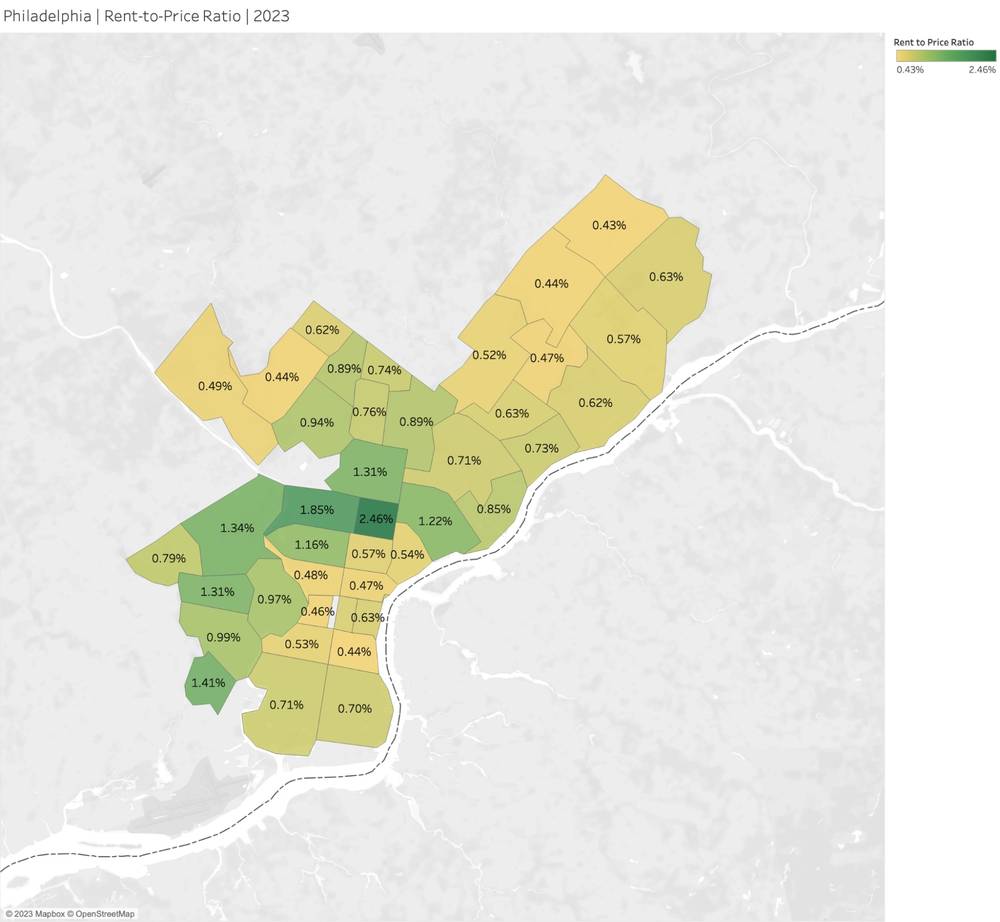Philadelphia, also known as the “City of Brotherly Love,” is home to about 1.6 million people, making it the 6th largest city in the United States. It features a decently-sized job market, some of the top colleges and universities in the country, a very devoted sports crowd, and a unique blend of old and new America. It also happens to have one of the most affordable real estate markets amongst large cities in the country, but it’s not all rosy.
In this article, we’ll cover the important information you need to know about Philadelphia and investing there.
Population and Labor Market
We’ll start with some of the bad news in Philly. The resident population has been on the decline since 2020. While it’s not the worst decline (only 30,000 fewer people), buying real estate in a place where people are leaving more often than entering is never the best sign.

The reasons for the decline vary. A 2019 survey from Pew Research found that most residents were leaving due to employment. While Philadelphia has a decent job market with a strong presence in healthcare, telecoms, and education, it’s also smack in the middle of New York City and Washington, D.C. A lot of the freshly educated minds coming out of the city’s various top colleges, including the University of Pennsylvania, wind up getting recruited to those markets. Of course, this survey was taken before the pandemic, so it’s also safe to assume that many left the city due to the familiar reasons we saw in other cities: a sharp increase in crime, economic and social upheaval, and a desire to stay out of crowded areas.
But it’s also important to note that Philadelphia’s unemployment rate has always trended above the national average and was especially harsh during the pandemic years. So overall, Philadelphia’s crutch is its lack of opportunity.

While Philly’s declining population isn’t a deal breaker, it’s something to pay attention to.
Philadelphia Home Prices and Inventory
The redeeming factor of Philadelphia is its home prices. It has consistently remained more affordable than many of the country’s largest cities. While it experienced rapid appreciation during the pandemic, like everywhere else, its prices are still extremely affordable. In fact, home prices are roughly $200k less than the national average! For outsiders, this makes Philly extremely attractive. For insiders, it’s indicative of the city’s economic struggles and stagnant population.

But, of course, from the investor’s perspective, Philadelphia offers plenty of opportunities—so long as you can fill the unit.

The chart above shows supply. This doesn’t look any different from most other markets. We’re in a low-supply environment all the way around.
Philadelphia Rent Prices
Since 2020, rent prices have appreciated steadily, from a median price of $1,568 to now $1,760. It’s not the same story as some other markets that have skyrocketing rents, and that’s largely due to the available supply and declining population.

I’ll note that if you can fill a unit with a tenant, it’s much easier to cash flow here than in other cities, but I will add the caveat of increasing mortgage rates and the significant pressure it’s putting on cash flow.
Cash Flow Prospects in Philadelphia
Speaking of cash flow, Philadelphia made our top 10 list for the best cash flow markets earlier this year. The reason, you may have guessed, is affordable homes and relatively high rents.

In the map above, you’ll see the rent-to-price (RTP) ratio of each ZIP code, which is an indication of cash flow viability. Generally, you want to find an RTP ratio close to 1% when looking for cash flow.In Philly, most of the best cash flow options are north and west of Center City. The top ZIP codes in Philadelphia for RTP are:
- 19133 – Fairhill (2.46%)
- 19132 – Allegheny West (1.85%)
- 19142 – Elmwood (1.41%)
Just keep in mind that with higher interest rates, you might find it hard to cash flow, even in a market that’s been favorable for it in the recent past.
Winning Strategies
Brandon Ribeiro, an investor-friendly real estate agent in the Philadelphia area, tells us that “most properties right now simply don’t work for cash flow considering the interest rates, so investors will walk away from them. However, you can leverage less money out-of-pocket by house hacking. Then, in a year or so, move out and refinance when rates decrease. This can give you a nice start to your portfolio.”
If you’re interested in learning more about investing in Philadelphia, partner with a local investor-friendly real estate agent like Brandon Ribeiro, who can guide you through which strategies, tactics, and neighborhoods to focus on.
Here’s how to contact Ribeiro on Agent Finder:
- Search “Philadelphia, Pennsylvania”
- Enter your investment criteria
- Select Brandon Ribeiro or other agents you want to contact
Find an Elite Agent in Minutes
Agent Finder makes it fast, free, and easy to find agents that know investing.
Match with market experts like Peter Stewart of Indi, Brandon Ribeiro in Philly, Dan Nelson in Chicago, and Jodi Gauthier of Houston.
Build your dream team now!
Brandon and his team conducted over $165M in real estate transactions in 2022, helping every side of the table, from buyers to sellers to developers. He actively invests in short and long-term rentals, new developments, and flips. He plans to focus on his development business and acquire mid-sized multifamily deals through 2023.
Note By BiggerPockets: These are opinions written by the author and do not necessarily represent the opinions of BiggerPockets.
